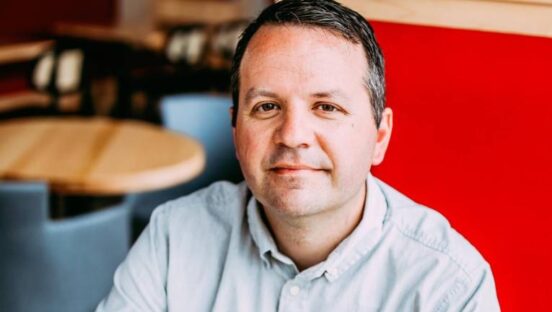It wasn’t long after Scooter’s Coffee opened its first location that founders Don and Linda Eckles saw how complicated it could be to outsource the growing, harvesting, and roasting of the coffee beans needed to run their drive-thru coffee business. At the time, the concept of specialty coffee was in its infancy—adding to the strain of finding the right suppliers. Realizing the benefit of owning pieces of the supply chain, Scooter’s Coffee created Harvest Roasting and became a vertically integrated system.
A vertically integrated brand is one that owns part—if not all—of the supply chain to produce or manufacture the brand’s product. What was initially done out of necessity to ensure our brand’s growth became a great competitive advantage. Being a vertically integrated system allows us to pivot quickly. If we want to change one of our pastry boxes, we can do that fairly easily without having to make multiple parties happy.
Every decision we make is with a “franchisee first” mindset. As a franchisor, our franchisees’ success is vital to us. With direct management of our supply chain, we’re able to ensure our franchise partners can easily get high-quality products and supplies sent directly to their locations. A number of our franchise partners are new to franchising altogether or new to the coffee industry. Creating a business model that’s easy to operate is crucial to our growth as a brand but also for their growth as individual businesses.
This was especially important during the height of the pandemic. While so many other businesses were closing, our locations were able to stay open. With Harvest Roasting having one customer—our franchisees—and our brand carrying one primary product line, what was complicated for many other businesses wasn’t as difficult for us. Having a streamlined supply chain allowed us to focus on our franchisees’ needs and the core products they sold in their drive-thru locations. Plus, our system saw incredible growth during that time because our locations were able to stay open.
At Scooter’s Coffee, we’re always playing the long game. We saw that our vendors were, rightfully, nervous about seeing an increased volume of cancelled and returned orders. So, we had many discussions with them about how we could help. Instead of trying to cut costs or haggle for a more affordable price considering the uncertainty of the situation, we asked, “How much do you need us to buy?” Our vendors are vital to the success of our franchisees. In an effort to strengthen our partnership, we purchased a tremendous number of products to help them keep their employees busy and their businesses afloat. This has paid off greatly now that the world is somewhat returning to normalcy. As demand increased again, our suppliers prioritized our orders as a means of returning the favor.
This has allowed us to remain optimistic for the future. As we all deal with the rising rate of inflation and gear up for a potential recession, Scooter’s Coffee is able to remain predictable as a franchisor. Supplier costs can change monthly, even weekly. And while there is a lot that we cannot control, our franchisees can feel comfortable knowing that we’re very methodical in our approach to supplier costs.
More than just providing exceptional coffee, we focus on fostering relationships. We know all of the people that we’re working with—and the relationships we have with our coffee farmers always precedes the business transaction. It’s important to us to know the people we’re partnered with beyond the coffee they’re providing us.
Vertical integration allows us to create value for our franchisees. Having control of our supply chain gives us the flexibility to adjust our model to better help the franchise owners who live our business and core values every day. We’re able to hear their feedback and take their thoughts into consideration. When we ask franchisees, “What’s one thing you could change and why?” we’re planting the seeds for future growth. Sometimes we can’t change certain things – at least not yet—but that doesn’t mean we won’t in the future.
Most people don’t know this, but it takes five to seven years for a coffee plant to grow. It’s not until 10 years after the seed is planted that farmers get a yield that’s worth something. Coffee is a long-term investment, and that’s how we look at our supplier relationships. We’re committed. We’re here for the long haul. And we hope to see the seeds we’ve planted bear fruit as we grow.
Nick Jarecke, Senior Vice President of Scooter’s Coffee, is responsible for executing the strategic direction of Harvest Roasting, Scooter’s Coffee Supply Chain, including oversight of coffee and food, manufacturing, and distribution for more than 600 restaurants across the U.S. With 20 years of experience, Nick’s primary focus is developing strong teams to drive business results in quality and food safety, strategic sourcing and cost management, logistics and supply chain digitalization, new product commercialization, field execution and supplier diversity, leading to enhanced supply chain resiliency and franchisee profitability. He previously held leadership roles in major companies like Kellogg’s, Tyson, Nestle, and General Mills, working in supply chain under a range of experiences.


